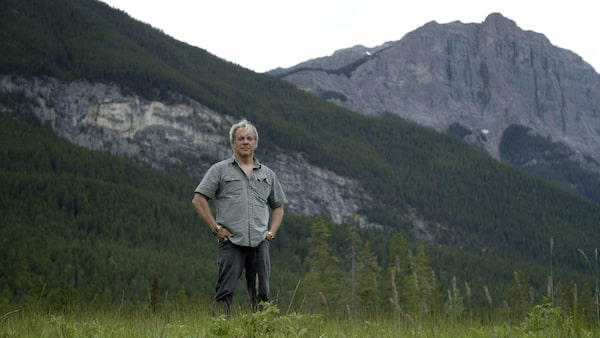Drew Hayden Taylor is an Anishnawbe playwright and humorist.

Humorist and playwright Drew Hayden Taylor.Handout
This week I am starting work on a screenplay, adapted from one of my plays. And in this ever increasing politically correct world, there is a dilemma I will have to face at some point: How frequently should I use, or not use, the “I” word in the script? I am, of course, referring to the word Indian, which is a term still commonly used in many First Nations.
Its origins are frequently thought of as a mistake of geography when several hundred years ago tourists began showing up looking for cheap cigarettes and gas and mistook Turtle Island for India. Once universal, the term is now considered more racist than descriptive.
That is the dilemma of which I speak. When is an Indian not an Indian? Are we First Nations? Yes, but frequently that was more of a political designation, and sometimes as I’m enjoying my coffee on the deck talking with family, I don’t quite feel like identifying as a political designation. Same with Indigenous. Everybody is Indigenous to someplace, so it is a complex issue.
Do not get me wrong. I am not advocating for the general return of that particular moniker. As mentioned, too often it has been laced with racism and misinformation. Remember former Ontario premier Mike Harris and his famous Ipperwash declaration “I want the fucking Indians out of the park!” (Spoiler alert – they’re still there.)
But it is a term still used in many corners of this land unfortunately in both an affectionate and racist manner. We call the land Indian Country. And for me, Indian Country starts right outside my door. Many members of my family will use the “I” word more frequently than First Nation or any other, except for maybe Nish, which is an abbreviation of the word Anishnawbe, our nation.
My cousin Shelley, who is finishing up her PhD in Indigenous education, maintains it is still a valid term despite preferring Anishnawbe. And as anyone in Indian Country knows, nothing is valid, nothing exists, nothing is important unless you first contact and consult with one or several cousins. It’s sort of an Indian bylaw. She says: “I agree with an elder I once heard that said as long as there is an Indian Act, I am an Indian. I am legally defined as an Indian.”
Clarence Louie, the Chief of the Osoyoos First Nation in British Columbia, wrote in an e-mail that he believes “most of my people (including me) have grown to love the word ‘Indian.’ It’s what binds us Rez people together under the treatment of Canada and the U.S. towards my people. Every Tribe has a name in its own language but in English it’s the word ‘Indian’ that brought First Nations together. As the oldest elder on my Rez often says, ‘I was born an Indian and I will die an Indian!’”
On my reserve there’s an automotive company called the Indian Rubber Tire Company, which I believe is self-explanatory. Irony is frequently embraced on the reserve.
I guess that’s the approach. If you’re within the First Nation/Indigenous circle, you can wield the epithet with complete abandonment, and revel in it. It’s one of the few frills having an “Indian” status card can bring you. Or so I thought.
Recently I wrote a play called Cottagers and Indians. It was produced by Tarragon Theatre in Toronto and eventually toured to Ottawa and many other communities in south and central Ontario. During the tour I was told that several people phoned or e-mailed the host theatres complaining of the use of the “I” word. They found it offensive. I was told they all came off sounding like white/Caucasian/people of pallor putting on their social warrior Crocs and coming to our rescue; to the best of my knowledge, no First Nations people found the title objectionable.
Of course there is a difference between Native and non-Native use of the word. It does make me uncomfortable when those who have not wrestled with the repercussion brought on by the Indian Act toss the word about. I see it as our word now, much as the Black community has reclaimed offensive terminology. Spoken from a privileged mouth, it doesn’t have the joie du vivre that we give it.
But like many things in life, there are exceptions to all the rules.
I wrote a play that was sort of a biography of Sir John A. Macdonald, and the term was liberally spiced throughout. I had difficulty imagining Sir JAM saying to his aides and ministers in the last part of the 19th century, “Get those damn First Nations people off that land!” While I am no historian, I am fairly sure the term Indian was liberally used and was part of the vernacular at that time. It would seem odd to clean the language up and make the colonizing of Western Canada rather neat and polite. But hey, that’s just me.
I should also add that, should “Indian” be driven into extinction, some of the excellent books being produced by our writers – such as Thomas King’s The Inconvenient Indian and Indians on Vacation; Indian Horse by Richard Wagamese and Five Little Indians by Michelle Good to name a few – might have to undergo a radical retitling. There’s a certain visceral appeal to a title such as The Inconvenient Indian. Or is it just me?
One final word, I gave a presentation at a conference on multicultural humour in Kerala, India, where I was, in fact, an Indian in India. Nobody there got the joke.